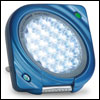 Researchers at the University of South Carolina in Columbia report; “bright light therapy produced a significantly greater improvement than placebo in sleep disturbances specific to post-traumatic stress syndrome (PTSD).”
Researchers at the University of South Carolina in Columbia report; “bright light therapy produced a significantly greater improvement than placebo in sleep disturbances specific to post-traumatic stress syndrome (PTSD).”
The study (see abstract 0706) will be presented during the 24th annual meeting of the Associated Professional Sleep Societies LLC.
First, the details.
- 16 veterans who participated in Operation Iraqi Freedom and now had combat PTSD were randomly assigned to a treatment group for 4 weeks.
- Bright light (daily 10,000 lux for 30 minutes)
- Placebo inactivated negative ion generator
- A Clinician-Administered PTSD Scale (CAPS- 2) was administered before and immediately following completion of the study.
- At weekly intervals, depression was assessed with the Beck Depression Inventory (BDI-II), and sleep quality was assessed with the Pittsburgh Sleep Quality Index (PSQI) with the addendum for PTSD (PSQI-PTSD).
And, the results.
- Preliminary results showed a significant improvement in sleep quality following bright light vs placebo.
- There were no statistically significant changes in the other parameters measured.
The bottom line?
The results are preliminary and may change after all the findings are analyzed.
However, based on available data, the authors concluded there’s a “potential for the use of bright light therapy in the treatment of PTSD symptoms and associated morbidity.”
The study is important because, “Disturbed sleep is known to interact with depression and anxiety in a vicious cycle. By reducing the severity and occurrence of sleep disturbances,” say the authors, “it may be possible to reduce the severity of symptoms such as anxiety and depression in combat-related PTSD.”
Results from an earlier study by the same researchers suggested that bright light was associated with an anti-anxiety effect in healthy adults.
Bright light therapy is attractive because it’s relatively simple, self-administered, and inexpensive, with few side effects.
10/17/10 19:46 JR